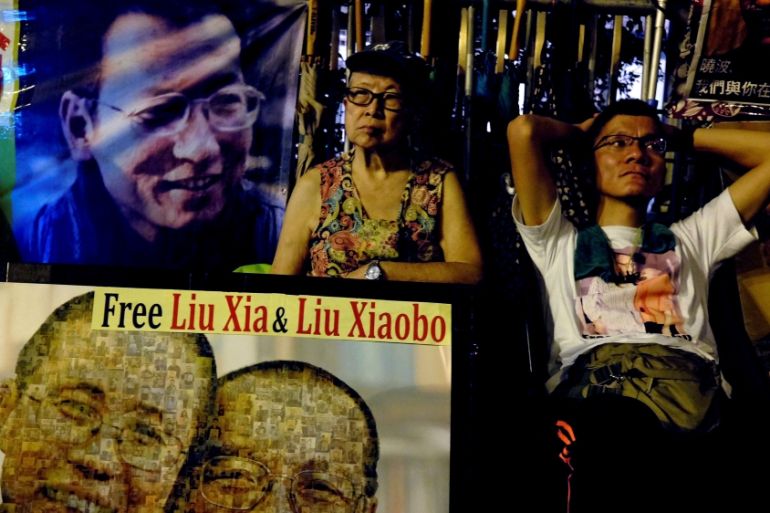Liu Xiaobo: China resists demands for overseas care
Liu Xiaobo, who is serving a sentence over subversion, suffers from cancer and is being treated at a Shenyang hospital.

China on Thursday resisted fresh international pleas to let cancer-stricken Nobel laureate Liu Xiaobo seek treatment abroad after the latest hospital updates suggested the democracy champion was close to death.
The United States and Germany voiced concerns over the 61-year-old writer, who remains in custody at a heavily guarded hospital in northeastern China, where doctors say his breathing and organs were failing.
Keep reading
list of 4 itemsWhat happens when activists are branded ‘terrorists’ in the Philippines?
Are settler politics running unchecked in Israel?
Post-1948 order ‘at risk of decimation’ amid war in Gaza, Ukraine: Amnesty
In response, Chinese foreign ministry spokesman Geng Shuang reiterated the government’s standard line: “We hope relevant countries can respect the judicial sovereignty of China and refrain from interfering in China’s internal affairs under the pretext of an individual case.”
In a statement Wednesday, the First Hospital of China Medical University said Liu needed artificial ventilation to stay alive, but his family declined.
READ MORE: Nobel laureate Liu Xiaobo in ‘critical condition’
Human rights groups have decried the lack of independent reports about Liu’s health, accusing the authorities of manipulating information as the hospital’s website has been the only source of medical updates.
US officials want Chinese authorities to allow Liu Xiaobo and his family the freedom to choose his medical care.
White House spokeswoman Sarah Huckabee Sanders said from Washington: “We remain concerned that both Mr Liu and his family are unable to communicate with the outside world and that he is not free to seek the medical treatment of his choosing.”
Liu was diagnosed with liver cancer in May while serving an 11-year sentence for inciting subversion after he helped to write a petition known as “Charter 08” calling for basic human rights and sweeping political reforms.
He was convicted in 2009 of inciting subversion for calling for political reform and was awarded the Nobel Prize a year later while serving his sentence.
Sanders urged China to grant him full parole and release his wife from house arrest.
‘Need to act’
While China’s censorship makes it difficult to assess Liu’s support, he is a “hero” for many liberals in China, even if few will speak out for him, a Chinese editor at an online publication said, declining to be named.
“I am really not sure if it’s accurate to claim he is unknown to the public, [or if] people are just too scared to show their knowledge [of Liu],” the editor said.
I call on #Beijing to free #LiuXiaobo & allow him to seek treatment wherever he wishes. #Taiwan willing to provide any medical assistance
— 蔡英文 Tsai Ing-wen (@iingwen) July 12, 2017
Despite the restrictions, internet posters have written in support of Liu and his cause, using variations on his name to avoid the censors.
“When it comes to freedom, comes to constitutional government, we have talked too much, now we need to act,” read one comment on the micro-blogging platform Weibo. “Situations like Liu Xiaobo’s are still a worry, but we nevertheless need people to act, bravely face the risk of death and act.”
Meanwhile, Chinese dissident artist Ai Weiwei says China’s imprisonment of Liu is “a shame for the Chinese government and a shame for the international community.”
Ai told The Associated Press in Germany that he has been friends with Liu since the 1980s. He described Liu “as a very soft and intellectual kind of scholar” who was falsely accused and wrongly imprisoned for openly discussing the country’s future.
Ai said Liu is one of many dissidents being oppressed in China.